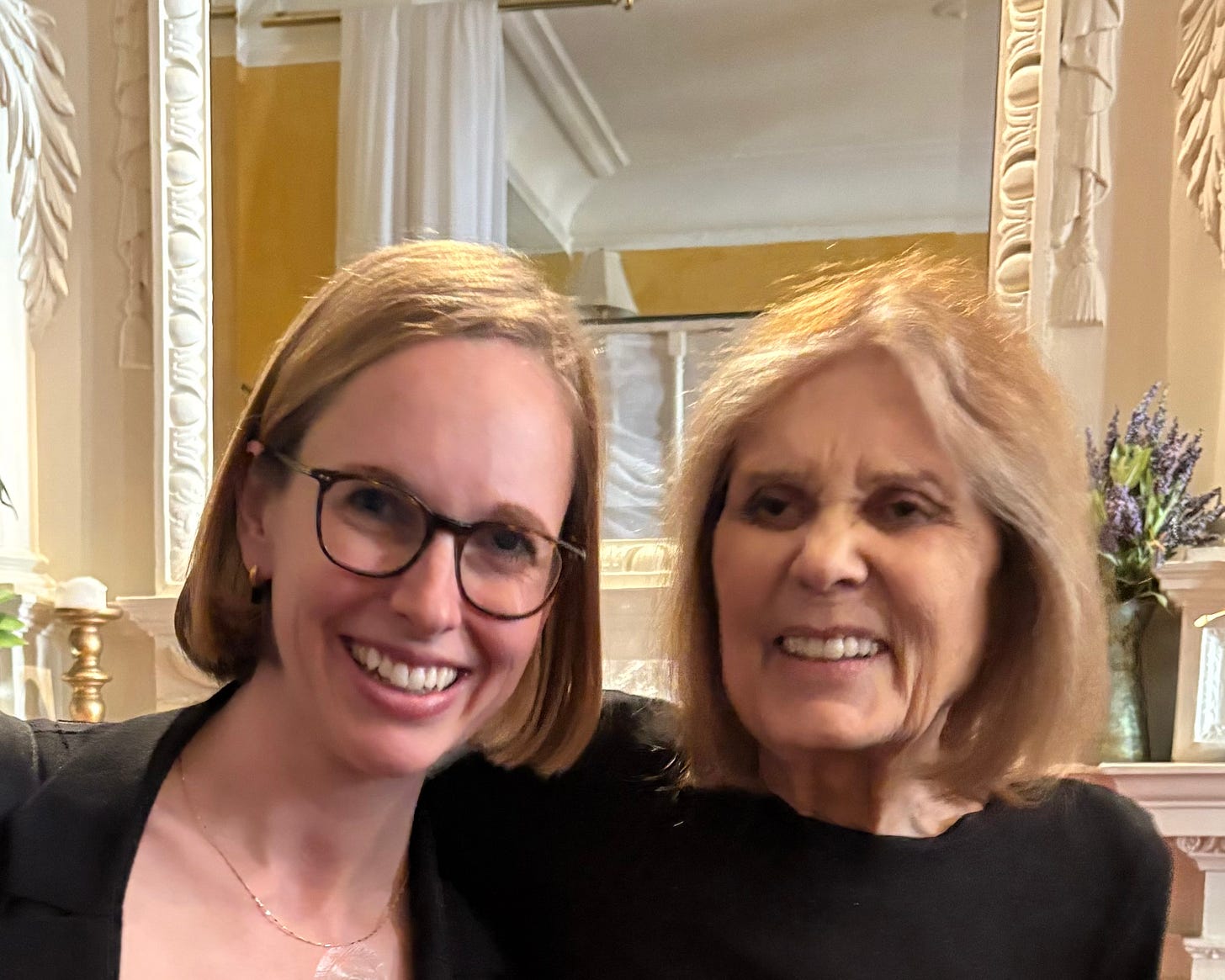Trillions and Trillions and Trillions of Dollars
Over the next few decades, a huge amount of wealth is expected to be inherited by members of Generation X, Millennials, and Gen Z. Women will disproportionately benefit.
ALSO IN THIS POST:
Gen Z has a big gender gap on feminism
Meeting Gloria Steinem
More than a century ago, in the summer of 1916, when Hetty Green—a New York City-based investor—died, she was both lauded as the richest woman in America and admonished as the “Witch of Wall Street."
The logic was that women had no business in the world of money. And Green had a lot of it. By investing in the stock market, she had grown an inheritance she’d received as a young woman to the equivalent of $2.8 billion in today's money. These riches rendered her unnatural; obscene, even, in the eyes of the media. She was dubbed America’s first female tycoon.
As recently as 50 years ago, the social norms that Green contended with were still underpinned by hard and fast legislation and regulation.
Until 1974, women in the U.S. were widely barred from having a credit card in their own name. Until 1978, pregnant women in paid work were not explicitly protected from discrimination by the law. Until 1988, a woman could be denied a business loan because of her gender. Money, earning it, borrowing it, spending it and investing it was simply beyond—or at least not within—the accepted domain of women.
Of course today, many women (though not too many women) have broken into the boys club atop Wall Street banks and investment giants. More women than ever (though still only about 10%) run Fortune 500 companies. And women account for half of all entry-level jobs in the financial services industry. But there’s still a gaping gender gap in terms of women’s representation in the seats that hold most of the power, not to mention in terms of women’s confidence and literacy when it comes to spending and investing. Men are also still the primary financial decision makers in roughly 60% of affluent U.S. households, according to McKinsey.
All of this is, of course, troubling. But it’s especially troubling if, as I have been doing lately, you dwell on the fact that a huge wealth transfer is about to occur.
What I mean by that is that, over the next few years, as members of the Silent Generation and the Baby Boomer generation pass on, they’ll leave trillions of dollars worth of cash and other assets to their beneficiaries: members of Generation X, Millennials, and Gen Z.
Perhaps most notably, though, because women globally are outliving men, this will be a gendered transfer, and for all of us—regardless of gender—the benefits could be prodigious.
In fact, it could turn out to be one of the most effective catalysts in our lifetime spurring greater financial equality between genders. And that’s largely because women and men make different decisions when it comes to investing and spending. Women give more generously to philanthropic causes than men, for example, and they’re more likely to fund initiatives for common social good. Women are also more likely to fund women-owned businesses. These, in turn, are more likely to hire and promote more women. Could that lead to a shrinking of the gender pay gap? It’s certainly possible.
But if women aren’t included in the worlds of financial prowess, if they don’t feel like they can call the shots or otherwise be heard; if they don’t feel empowered to control those funds, or are belittled, a rare opportunity will be lost.
Gen Z’s Gender Problem
Elsewhere over the last two weeks, I wrote for Forbes about some research conducted by public opinion pollster Ipsos UK and the Global Institute for Women’s Leadership at King’s College London, showing that young women and men in their late teens and twenties are more divided than any other age cohort when it comes to their opinions on feminism.
The researchers found that individuals belonging to Gen Z— broadly defined as those born between 1997 and 2012—are more divided than any other generation on a host of topics: whether they define themselves as a feminist; whether a man who stays home to look after his children is less of a man; whether men are being expected to do too much to support equality; and whether we’ve gone so far in promoting women’s equality that we are discriminating against men.
Some 53% of Gen Z women, for example, agree with the statement that they define themselves as a feminist, while only 32% of Gen Z men do — a huge 21 percentage point gap. For millennials the respective proportions are 46% and 32%—a 14 percentage point gap—while for Gen X respondents they’re 37% and 29%—an 8 point difference.
Similarly, 19% of Gen Z women said that they thought a man who stays at home to look after his children is “less of a man,” compared to 28% of men in the same generational cohort. That 9 percentage point gap is more than double the gap for Millennials and Gen X when asked that same question.
Gen Z respondents were also more likely than older generations to perceive a tension between genders in their respective country. Some 59% said that they considered there to be a gap, compared to 54% of Millennials, 47% of Gen Zs and just 40% of Baby Boomers.
Professor Heejung Chung, Director of the Global Institute for Women’s Leadership at King’s College London, noted that the divides like this between genders are “often fueled by politicians and media who capitalize on a zero-sum game narrative – framing the advancement of women as the cause of broader societal grievances, such as the decline of well-paid, secure jobs.”
But “it is essential to promote a growth mindset, reinforcing the idea that gender equality can benefit everyone,” she added.
Kelly Beaver, Chief Executive of Ipsos in the UK and Ireland, commented that this data “underscores the urgent need for nuanced conversations and inclusive solutions that address the concerns of all genders [...] particularly when considered against the backdrop of recent elections in the U.S. and Germany, where young men were significantly more likely than young women to back right-wing political parties.”
“We must find ways to bridge this divide and ensure that progress towards gender equality benefits everyone, without leaving anyone behind,” Beaver added.
Overall, 24,000 individuals were surveyed across 30 nations in which the research was conducted, and the researchers observed clear variation by country. South Korea, for example, ranked worst for perceptions of tension between men and women, with 76% of all respondents in that country saying that tensions exist. In Britain, 40% of respondents agreed, while in the U.S. 58% said that they thought there were tensions between genders.
Meeting a Hero
Finally this week, I was going to write about meeting Gloria Steinem in her Upper East Side Apartment, the apartment where she’s lived since the 1960s, the apartment where she co-founded Ms. Magazine, the apartment that was effectively the HQ of second-wave feminism. But instead, I’ll just leave you with this, because sometimes extra words really aren’t that necessary.
That’s all from me for this week. I’ll be back in your inboxes March 31. If you’ve enjoyed reading this newsletter for free, I’d urge you to consider upgrading to a paid subscription.
Paid subscriptions help support my work, enabling me to publish better, more deeply-reported content and sharper analysis, more frequently.
Josie
Ps: If you’ve read WOMEN MONEY POWER, the book, or listened to the audiobook, I would hugely appreciate it if you could take thirty seconds to post a review or rate it on Amazon using this link. If Goodreads is your jam, that’s just as great, and you can leave a review or rating here. A million thanks for your support!






Fascinating insight on the perception of gender roles and its potential to influence the outcome of the upcoming wealth transfer from Boomers to Millennials. Thanks for the great read!